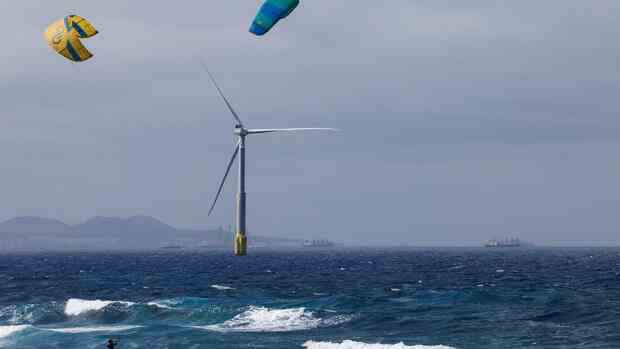Siemens Energy takes its crisis subsidiary off the Spanish stock exchange.
(Photo: Reuters)
Munich The Dax group Siemens Energy can take its crisis subsidiary Siemens Gamesa off the stock exchange for further restructuring. The annual general meeting of the Spanish subsidiary in Bilbao voted in favor of the so-called delisting on Wednesday. As Siemens Gamesa announced at the Annual General Meeting, the Spanish stock exchange supervisory authority CNMV is to take appropriate steps on the stock exchanges in Madrid, Barcelona, Bilbao and Valencia.
The decision to delist was purely a matter of form. With a multi-billion takeover bid, Siemens Energy had increased its stake to almost 93 percent at the turn of the year. That was enough to force the delisting. The major shareholder hopes for annual synergies of around EUR 300 million from the complete integration of the holding and wants to achieve the operational turnaround of the Siemens Gamesa business.
The big challenges are yet to come. Siemens Gamesa has been making losses for years and also surprised the parent company in Munich with more and more bad news.
Quality problems lead to new losses
Last week it was time again: Siemens Gamesa announced an operating loss before special items of 760 million euros, mainly due to quality problems in older systems. As a result, Siemens Energy has already had to accept the forecast for the current fiscal year.
Top jobs of the day
Find the best jobs now and
be notified by email.
With the withdrawal from the stock exchange, the restructuring of Gamesa will now be a little easier, according to company circles. The reporting obligations would have tied up capacities, and the only indirect control over the board of directors, which has now been reduced from ten to three members, did not work.
Gamesa could be integrated even better through a complete takeover. However, Siemens Gamesa did not secure enough shares to force the remaining shareholders out of the company. However, Siemens Energy is still aiming for a 100 percent stake. According to estimates in industry circles, for example, relocating the company headquarters would be one way to do this.
Many problems are homemade
Siemens Gamesa suffers from various problems. All manufacturers are struggling with rising material costs for steel, for example. The old contracts in the industry usually did not provide for the possibility of passing on the price increases to the customers.
But at the German-Spanish company, which emerged from the merger of Siemens Windkraft with its competitor Gamesa, many homegrown problems arose. Synergies, for example, between the offshore wind turbines on the high seas and the onshore systems on land were not used, and the start-up of the first jointly developed 5.X platform went poorly.
Losses in the renewable energy business masked progress in Siemens Energy’s other divisions. Business with the power grids, gas-fired power plants and new technologies such as hydrogen has recently developed better than expected. Nevertheless, Bruch had to accept the forecast of significantly lower losses.
In business circles it was emphasized that the increase in shares and the delisting were a clear sign that Siemens Energy definitely wanted to hold on to wind power despite the setbacks in the renovation. For an integrated energy technology group, the business with renewable energies is indispensable.
Wind power continues to be a growth area worldwide. The USA, for example, has recently been increasingly focusing on large offshore projects. Siemens Gamesa is the world market leader in this field.
More: Federal government promotes expansion of wind power on the high seas

